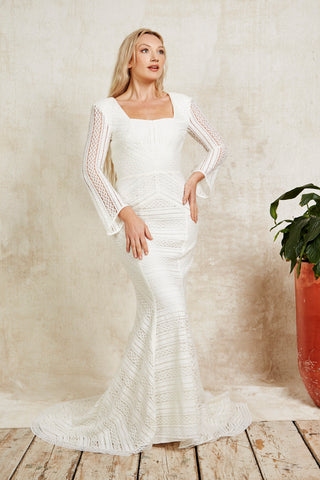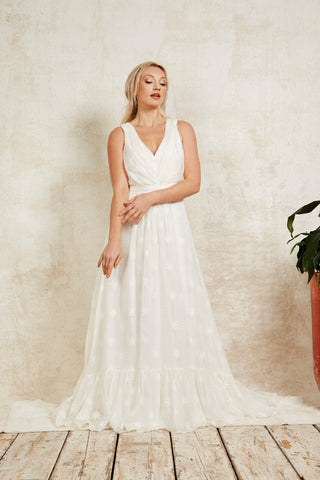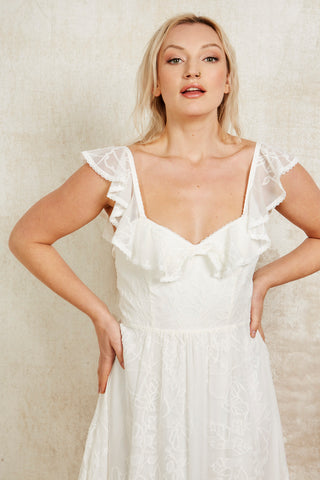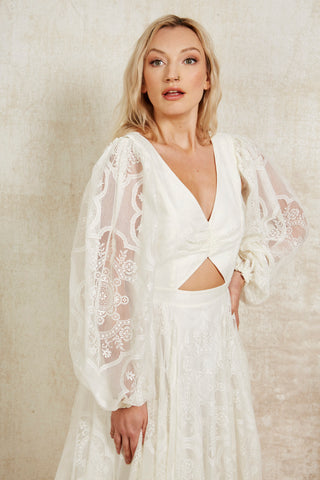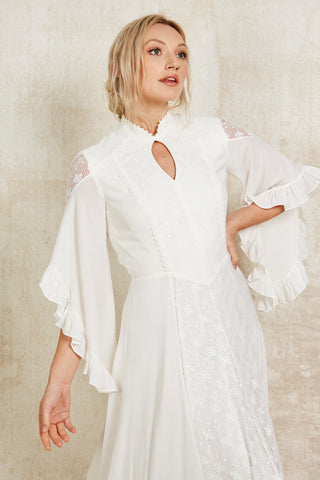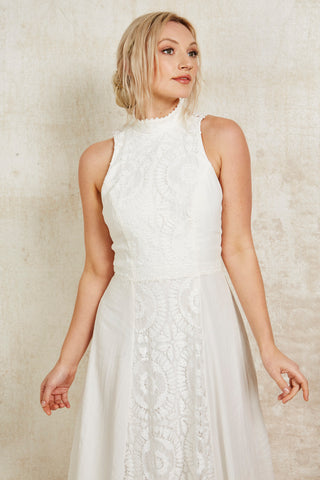For some brides, starting the journey to find their wedding dress can be a daunting task, partly because of the myriad of fashion terms, some of which are only used in bridal wear and tailoring. Understanding the language surrounding bridal wear can make the process of finding your dream wedding dress smooth and enjoyable. So we decided to draft a comprehensive guide to bridal lingo to help you navigate through the intricacies of the bridal wear world, communicate effectively with your bridal consultant, and understand the design options available to you.
Silhouettes
One of the first decisions a bride makes when selecting a wedding dress is the silhouette, as it defines the overall shape and structure of the dress. Understanding different silhouettes can help you narrow down your options and find the style that flatters your figure.
Common silhouettes include:
- A-Line: Flares gently from the waist, resembling the shape of an uppercase "A." Universally flattering and versatile.
- Ball Gown: Features a fitted bodice and voluminous skirt, creating a fairy-tale princess look.
- Sheath/column: Modern and minimalistic silhouette. Sleek and form-fitting, follows the body's natural contours from top to bottom.
- Empire: Features a waistline that sits right under your bust, creating an elongated skirt. This silhouette suits many different body shapes and is one of our brides’ favourites.
- Dropped waist: A silhouette where the waistline is dropped below the natural waistline. Often featured in 1920’s vintage wedding dresses.
- Mermaid/Fishtail/Trumpet: Characterised by a fitted bodice and a skirt that is fitted around your hips but flares out around the knee height, the mermaid silhouette accentuates curves and creates a glamorous, hourglass shape.
- Fit-and-Flare: A silhouette between the A-line and mermaid. It has a flare more subtle than in the mermaid silhouette, but is more fitted than the A-line silhouette.
Necklines
The neckline plays a crucial role in the style of the wedding dress and can accentuate or mitigate certain features.
Here are some common necklines:
- Sweetheart: Named for its heart-shaped dip in the centre, the sweetheart emphasises the décolletage.
- V-neck: With a V-shaped dip in the front, many different depths.
- Square neck: Angular shaped neckline, can be soft or sharp.
- Scoop neck: A low cut, U-shape neckline.
- Boat neck: An elegant and modest neckline, exposing the collar bones.
- Cowl neck: Has loose folds of fabric that drape under the collarbones.
- Illusion: Features sheer fabric adorned with lace or embellishments.
- One-shoulder: Asymmetric neckline constructed with only one shoulder strap or sleeve.
- Off-the-Shoulder: This neckline rests below the shoulders, exposing the collarbones and shoulders.
- Halterneck: A sleeveless wedding dress that has straps or a neck that runs close to the neck and meets at the back of the neck.
Sleeves
As you’re reading the Indie Bride London blog, you’re going to get a vocabulary of sleeves as well. We love dresses with sleeves and often find them more interesting than dresses without sleeves.
Here are a few sleeves styles you can choose from when you choose and Indie Bride London dress:
- Flounce: Flares out at the hem of the sleeve. Our Cassidy and Florence dresses have gorgeous flounce sleeves.
- Poet sleeve: A puffy sleeve that features ruffles on the cuffs. Our Bailey dress has a detachable cold-shoulder poet sleeve and Wynona dress a short poet sleeve.
- Bishop sleeve: Bishop sleeve is a smaller version of peasant sleeve. Our Tanita dress has a bishop sleeve with slit and slight gathering on the shoulder as well.
- Long bell sleeve: A sleeve that hangs loose from the shoulder and flares out like our Pixie dress and Clover dress sleeves.
- Short bell sleeve: Maybel dress
- Peasant: Billowy sleeve that has gathering at the shoulder and is gathered around the wrist as well. Our Denver dress has detachable peasant sleeves.
- Butterfly sleeves: Short, feminine fluttery sleeves like in our Laramie dress.
Fabrics and Embellishments
The choice of fabric and embellishments can significantly impact the overall look and feel of a wedding dress. It can make the dress feel heavy or light, easy to move in or hard to move in etc.
Here are some common options to consider:
- Lace: Known for its timeless elegance and intricate detailing, lace adds texture and romance to wedding dresses. Laces come in different styles and are often made from polyester or cotton.
- Tulle: Lightweight and ethereal, tulle is a versatile fabric used in bridal dresses as well as veils. Its soft and airy texture creates a dreamy effect, perfect for whimsical and romantic weddings. Tulles are usually made from either polyester or silk.
- Satin: Smooth and luxurious, satin is a classic choice for bridal gowns, offering a subtle sheen and a flattering drape. It's ideal for traditional and formal weddings. Satin, as well, is usually made from polyester or silk.
- Beading: Beading and sequins add sparkle and glamour to wedding dresses, catching the light and creating a dazzling effect.
- Embroidery: Intricately stitched patterns and motifs, embroidery adds depth and dimension to wedding dresses and can be anything from floral designs to geometric patterns.
- Chiffon: A sheer fabric with a light, floaty, and airy nature. It is usually made from polyester or silk and has a smooth surface.
- Georgette: Single georgette is similar to chiffon; sheer, light, and floaty. Double georgette has a beautiful drape and is thicker than single georgette. Both have a grainy surface. Usually made of polyester, viscose or silk.
- Organza: Crisp, stiff and sheer material with a beautiful shine. Perfect in volyminous wedding dresses. Traditionally made from silk, however, many modern organzas are woven with polyester and nylon.
For a more comprehensive guide to fabrics and materials used in bridal wear, head to our Wedding Dress Materials Matter blog post.
Other Bridal Wear Terms
- Bespoke: A wedding dress custom-made from scratch to your exact specifications and tailored to your body by a skilled dressmaker.
- Made-to-Order: Pre-designed styles that can be modified to suit your preferences. Handmade wedding dresses are always made-to-order.
- Made-to-Measure: Standard-sized patterns are altered to your body measurements for a perfect fit.
- Off-the-Peg: Ready-to-wear dresses available in standard sizes for immediate purchase. These can be second hand or old sample wedding dresses.
- Toile: Mock-up or prototype made from inexpensive fabric for fittings and adjustments.
Navigating the world of bridal wear can be a joyful journey when armed with knowledge about wedding dress terminology. By understanding different silhouettes, necklines, fabrics, and embellishments, as well as concepts like bespoke, made-to-order, made-to-measure, off-the-peg, and toile, you can confidently communicate your preferences and find the perfect dress for your special day. Happy dress shopping!
- Miina -


